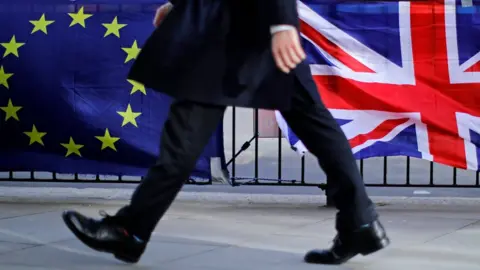Brexit: UK-EU trade talks resume ahead of June summit
 AFP
AFPTalks between the UK and EU over a post-Brexit trade deal will enter their third round later, ahead of a decisive summit next month.
Both sides are due to decide by the end of June whether the current deadline for negotiating an agreement should be extended beyond the end of December.
The UK has said it will not agree to an extension, even if the EU requests one.
The latest round of talks, to be held via video link, will end on Friday.
After the latest round in April, EU chief negotiator Michel Barnier said progress had been disappointing, whilst the UK said only "limited progress" had been made.
There are differences between the two sides on fisheries, competition rules, police co-operation, and how a deal would be enforced.
BBC Europe Editor Katya Adler said the EU accuses the UK of concentrating on its priorities whilst going slow on issues more important to the 27-member bloc.
She added that the UK wants to first settle a core trade deal alongside deals on aviation and energy, whilst the EU is keen to focus on fishing quotas and competition rules.
She added that although the UK has ruled out extending the talks, leaving tricky areas to the autumn could be risky if coronavirus infections peak again.
Negotiations have been held using video-conferencing technology since last month after face-to-face meetings were cancelled due to the pandemic.
The UK has rejected the suggestion it is not engaging in all negotiating areas, accusing the EU of making demands not required of its other trade partners.
Transition extension calls
The UK is currently in a transition period under which it must follow most EU regulations, following its legal withdrawal from the bloc on 31 January.
Both sides exchanged legal text on a future trade deal in March. After the negotiations this week, a fourth round of talks is scheduled to begin on 1 June.
Under the UK's withdrawal agreement with the EU, both sides currently have until 31 December to ratify a trade deal and rules for future co-operation.
An extension to the December deadline should be made by the UK-EU "joint committee" overseeing the agreement by 1 July.
Opposition parties including the Liberal Democrats and the SNP have both called on the UK government to extend the transition period beyond December.
Shortly after becoming Labour leader last month, Sir Keir Starmer said the UK should prolong talks beyond December if "necessary to do so".
He added that the December deadline was "going to be very, very tight," and he thought it "unlikely" the government would finish talks in time.
But the government insists it is committed to agreeing a deal by December 2020, and an extension would simply prolong disruption for businesses.
